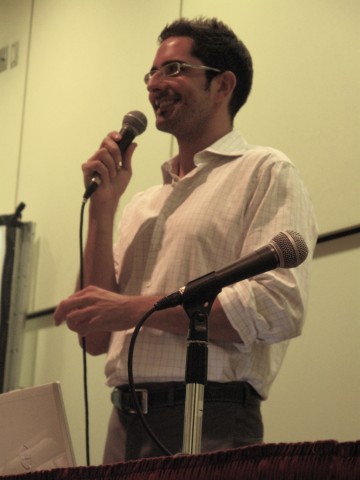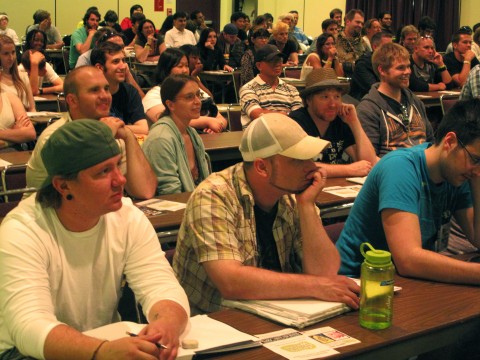
Kill Shakespeare co-creator Anthony Del Col spent an hour with fans Aug. 26 at Fan Expo discussing how to successfully break into the comic book industry as an independent creator.
Del Col said before you can even get started, you need to find a partner with whom you have similar interests with. He said he and co-creator Conor McCreery quickly realized soon after meeting that they have similar interests in movies, went to the same university, and soon found they had similar goals and made a handshake agreement to be 50-50 partners once they came up with the original idea for their hit title, Kill Shakespeare, about 10 years ago. He said the next step was to find someone who would be a good fit for them to draw their story, recalling how they called various art studios and asked if any artists would be interested.
“We’re looking for an artist, do you know anyone?” Del Col said, recalling a conversation with Cam Stewart, who put them in touch with eventual series artist Andy Belanger, who was mostly known at that point for his horror comics. “We wanted that darker fit for Kill Shakespeare.”
Del Col stated networking in the business was key, and that all it takes is a simple phone call or taking the initiative to seek out a potential partner to find the right fit for what you’re trying to accomplish. At the very least they can provide a recommendation and put creators in touch with potential artists.
“If you are a writer or creator, find someone in Artist Alley and ask them what they like to draw,” he said.
Once the essentials are in place, he said you have to foremost understand what your product is and who you are selling it to, even if it means bringing in a consultant and giving them a percentage of the profits. Before pitching, Del Col said you need to ensure your story is cohesive and present it in such a way that it impresses publishers.
“I’m a big proponent of coloured (pitch packages),” he said, believing you should spare no expense when it comes to presenting your work. “You usually only get one shot with these publishers.”
He said it’s imperative though to be able to effectively summarize your story idea in one sentence, such that potential investors or partners will be interested in your project and want to read through the rest of it. From there, Del Col said you should then expand your story’s summary in one paragraph, and then finally detail your story over a page. He also said it’s important to know what publishers are looking for.
“Many publishers want to know how many issues the trades are going to be,” he said, noting his and McCreery’s decision to split their 12-issue series into two six-issue trades. “For the first trade, you want to have a beginning, middle and end.”
Del Col said a great tactic to employ, which publishers love in a package, is to submit sample pages.
“You want to go in there and be able to go, ‘this is what the comic is going to look like’,” he said.

He said that with the current comic book industry landscape as it is right now, indie creators are going to have to take a lot of the initiative in getting their work noticed.
“This day in comics as an indie creator you’re going to have to do a lot of the work yourself,” Del Col stated, adding that when you’re pitching to publishers it’s key to talk about the core audience that is going to be interested in the product. Del Col used such comic books as Fables and Alan Moore’s League of Extraordinary Gentlemen, as well as the original Shakespearean works as examples for target audiences that may be interested in Kill Shakespeare. It’s also important to let publishers know what you’re going to do to market your product.
“Here’s what we’re going to do to market our title above and beyond what you’re going to do,” Del Col said, who noted several occasions where he and McCreery have tied in their releases, such as releasing issue ten of the series on April, 20, the closest release date to William Shakespeare’s birthday and St. Crispin’s day later this year when the second volume of Kill Shakespeare is released. This is intended to give the books extra pushes.
He said publishers also want to know about the principal characters involved in the story. It’s important to identify four to eight of the main characters and highlight who the character is, what motivates them, what their likes and dislikes are, how they might change throughout the story; identifying basic character arcs of the core characters is key to hooking the interest of publishers. What also helps is being able to provide financial projections and having done the market research to understand where the comic book industry sits right now, and identifying trends as they’ve developed over the last five or ten years. It’s also great to not be afraid to pitch aggressively, noting how he and McCreery have consistently pitched Kill Shakespeare as a potential multi-platform franchise on par with Lord of the Rings and Harry Potter.
Del Col wound down the panel by ensuring potential creators were aware of the deals that were available with specific comic book companies. He noted that if you pitch to either Marvel Comics or to DC Comics, they’re going to want to own the content and you’ll get a check up front for your work. As such, it’s beneficial to be aware of the creator owned model, where the creators own the content and retain the multimedia, multi-platform rights, while the publisher simply publishes the work and is paid to publish that work.
As the panel concluded, Del Col left the grateful audience with five crucial points to summarize his advice: the importance of finding the right partners for the project, networking, having a solid business plan, using social networking to promote the content and understanding above all what your comic is about.

